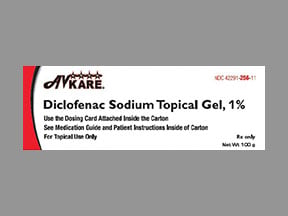
Eq Arthritis Pain Reliever Coupons & Savings Card – Discount Prices from $9.65
Brand for: Diclofenac sodium
Diclofenac is a medication used to alleviate joint pain associated with arthritis. It is part of a group of medications known as nonsteroidal anti-inflammatory drugs (NSAIDs). For chronic conditions like arthritis, consult your doctor about potential non-drug therapies or alternative medications to manage your pain.
Our Eq Arthritis Pain Reliever coupons are free to use. You can print the coupon, email it to yourself, or receive the Eq Arthritis Pain Reliever coupon via text message. To get your free discount, show the pharmacist your Eq Arthritis Pain Reliever savings card which has the discounted coupon price. Use our filters below to edit the prescription box to match your needs. The Eq Arthritis Pain Reliever prices will update based on your prescription needs. Above our Eq Arthritis Pain Reliever coupons, you can change the location to see pharmacy prices in other areas. Our prescription discount card will update online with the specific pharmacy costs associated with your edits. Be sure to text, email, or print the Eq Arthritis Pain Reliever savings card code that you need after editing the prescription box and location field. Show the discount card to your pharmacist before paying.
My prescription
Edit
100GM of 1%, Diclofenac Sodium (1 Tube)
Select pharmacy

Albertsons
$9.65
COUPON PRICE
Walgreens
$10.99
COUPON PRICE
Walmart
$19.56
COUPON PRICEEq Arthritis Pain Reliever savings card
Show this card to your pharmacist
Albertsons
$9.65
BIN
ID
PCN
GRP
019876
LHEA134AFC
CHIPPO
LHX
Powered by
Diclofenac is a medication used to alleviate joint pain associated with arthritis. It is part of a group of medications known as nonsteroidal anti-inflammatory drugs (NSAIDs). For chronic conditions like arthritis, consult your doctor about potential non-drug therapies or alternative medications to manage your pain.
Our Eq Arthritis Pain Reliever coupons are free to use. You can print the coupon, email it to yourself, or receive the Eq Arthritis Pain Reliever coupon via text message. To get your free discount, show the pharmacist your Eq Arthritis Pain Reliever savings card which has the discounted coupon price. Use our filters below to edit the prescription box to match your needs. The Eq Arthritis Pain Reliever prices will update based on your prescription needs. Above our Eq Arthritis Pain Reliever coupons, you can change the location to see pharmacy prices in other areas. Our prescription discount card will update online with the specific pharmacy costs associated with your edits. Be sure to text, email, or print the Eq Arthritis Pain Reliever savings card code that you need after editing the prescription box and location field. Show the discount card to your pharmacist before paying.
More prescriptions for rheumatoid arthritis
coupons from$13.87Save 71%
coupons from$448.11Save 28%
coupons from$6.67Save 82%
coupons from$5554.87Save 17%
coupons from$3.78Save 75%
coupons from$149.25Save 83%
coupons from$6508.48Save 14%
coupons from$116.20Save 89%
More prescriptions for rheumatoid arthritis
Plaquenil Save 71%coupons from $13.87
Cortisone Save 28%coupons from $448.11
Indomethacin Save 82%coupons from $6.67
Olumiant Save 17%coupons from $5554.87
Prednisolone Sodium Phosphate Save 75%coupons from $3.78
Naprelan Save 83%coupons from $149.25
Cimzia Save 14%coupons from $6508.48
Zipsor Save 89%coupons from $116.20
Eq Arthritis Pain Reliever (Diclofenac Sodium) dosage forms
Use our Eq Arthritis Pain Reliever (Diclofenac Sodium) 100GM coupon with prices from $9.65 for 1 Tube. You can also use our Eq Arthritis Pain Reliever (Diclofenac Sodium) 100GM coupon with prices from $11.80 for 2 Tubes. We have a Eq Arthritis Pain Reliever (Diclofenac Sodium) 100GM coupon with prices from $13.95 for 3 Tubes. You can use our Eq Arthritis Pain Reliever (Diclofenac Sodium) 100GM coupon with prices from $16.10 for 4 Tubes.
Dosage Quantity Price from Per unit 100GM 1 Tube $9.65 $9.65 100GM 2 Tubes $11.80 $5.90 100GM 3 Tubes $13.95 $4.65 100GM 4 Tubes $16.10 $4.03 100GM 5 Tubes $18.26 $3.65
| Dosage | Quantity | Price from | Per unit |
|---|---|---|---|
| 100GM | 1 Tube | $9.65 | $9.65 |
| 100GM | 2 Tubes | $11.80 | $5.90 |
| 100GM | 3 Tubes | $13.95 | $4.65 |
| 100GM | 4 Tubes | $16.10 | $4.03 |
| 100GM | 5 Tubes | $18.26 | $3.65 |
Eq Arthritis Pain Reliever FAQs
Using the SaveHealth discount card, what is the price of Eq Arthritis Pain Reliever without insurance?
Using the SaveHealth discount card, the price of Eq Arthritis Pain Reliever without insurance is $9.65.
What is the price of Eq Arthritis Pain Reliever at Walgreens?
The price of Eq Arthritis Pain Reliever at Walgreens is $10.99.
What is the price of Eq Arthritis Pain Reliever at Walmart?
The price of Eq Arthritis Pain Reliever at Walmart is $19.56.
